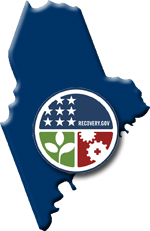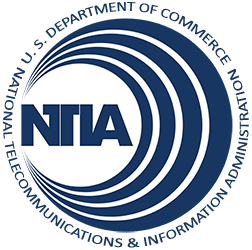Washington County is a major hub for blueberry farming and commercial fishing in Maine, but it is also the state’s poorest county. Axiom Technologies proposes a sustainable broadband adoption project that intends to provide broadband education, training, access, equipment, and support to community-serving institutions and economically vulnerable populations in the county. In addition, to address a healthcare worker shortage in the area, the project proposes to expand distance learning for healthcare professionals in partnership with the Central Maine Medical Center College of Nursing and Health Professions, with the goal of expanding the pool of local residents with associate degrees in nursing. The project also intends to equip ten local farmers and ten local fishermen with wireless equipment and a rugged laptop as a pilot project to help local industries utilize broadband technology in the field and for small business and economic development purposes.
Maine

| Grantee | Total Award | Type |
|---|---|---|
| Axiom Technologies, LLC | $1,429,596 | Sustainable Adoption |
| Communication Service for the Deaf, Inc. | $14,988,657 | Sustainable Adoption |
| Maine Fiber Company, Inc. (transferred from Biddeford Internet Corp. d.b.a. GWI) | $25,402,904 | Infrastructure |
| Maine State Library | $1,362,459 | Public Computer Centers |
| State of Maine, ConnectME Authority | $4,978,492 | Broadband Data & Development |
| University Corporation for Advanced Internet Development | $62,540,162 | Infrastructure |
Broadband’s ability to expand educational and employment opportunities is especially meaningful for Americans who are deaf or hard of hearing, a community that faces unique challenges in education and that suffers from a rate of unemployment much higher than the national average. Communication Service for the Deaf, Inc. (CSD) intends to expand broadband adoption among people who are deaf and hard of hearing and provide them with online tools to more fully participate in the digital economy. The project proposes to employ a combination of discounted broadband service and specialized computers, technology training from an online state-of-the art support center customized to the community’s needs, public access to videophones at anchor institutions from coast to coast, and a nationwide outreach initiative. Thousands will gain online access to all the Internet has to offer, including sign language interpreters, captioned video services, and other content and functionalities designed especially to advance their educational, employment, and healthcare interests.
The Three Ring Binder project proposes to create an open access fiber-optic network extending to the most rural and disadvantaged areas of the state of Maine – from the Saint John Valley in the north, to the rocky coastline of downeast Maine, to the mountainous regions of Western Maine – linking the unserved and underserved areas of the state together with a modern communications network. The project proposes a 1,100-mile network that will pass through more than 100 communities make broadband more readily available to 110,000 households, 600 community anchor institutions, and a number of last mile service providers. The public-private partnership expects to provide 100 Mbps broadband capabilities for University of Maine campuses, community colleges, government facilities, public safety departments, the MaineREN research and education network, and rural healthcare clinics and hospitals. The project plans to benefit clinics and hospitals by allowing for more immediate contact with clinical healthcare specialists and by increasing the collaboration of local community-based healthcare providers with specialists in major metropolitan areas.
In Maine, where a majority of the population lives in rural areas, broadband access and videoconferencing services can be crucial for fostering economic development, expanding training opportunities, and providing support to community-serving organizations. The Maine State Library plans to upgrade public computer centers at as many as 107 public libraries statewide and increase the number of available broadband workstations by as much as 60 percent by deploying approximately 500 new workstations and upgrading an additional 150. It also plans to enhance training opportunities by deploying 11 video conferencing regional hubs and three mobile computer labs to enable hands-on training in remote rural locations. The project plans to leverage the resources of three existing Maine State Library programs, which aim to improve employment-related services offered by libraries and make legal information and services more accessible to the public.
Project Components
State Broadband Capacity Building:
Through the Maine State Planning Office, the state will convene a broadband capacity building task force and manage the creation and implementation of a statewide plan to address broadband challenges. The state will integrate the broadband capacity building activities into existing state initiatives, including the state’s existing Quality of Place, Mobilize Maine, and Health Information Technology projects.
Technical Assistance:
Under the leadership of the Maine Department of Education Adult and Community Education Program, this project will expand the Maine Adult Regional Technology Initiative (MARTI), by providing intensive, ongoing training and mentoring in the use of technology in the classroom to 112 adult educators across the state. Given the limited broadband resources in many adult education centers in the state, limited funds will also be available to MARTI classrooms to improve access to broadband and technology tools.
Data Collection, Integration, and Validation:
This project was originally funded for broadband planning activities and two years of data collection. In September of 2010, this project was amended to extend data collection activities for an additional three years and to identify and implement best practices.
Address File Development:
The State of Maine will conduct a two-stage process that conflates the existing E-911, ConnectME and Department of Transportation centerline files, and then utilizes dynamic segmentation to generate an address file for the majority of communities and a traditional assignment approach for the few communities that did participate in the previous address normalization project.
As part of a longstanding project to connect essential community anchor institutions across the country, and facilitate closer collaboration and long-term benefits for education, research, healthcare, public safety, and government services, the University Corporation for Advanced Internet Development (UCAID) proposes a comprehensive 50-state network benefitting approximately 121,000 community anchors. The project proposes a large-scale, public-private partnership to interconnect more than 30 existing research and education networks, creating a dedicated 100-200 Gbps nationwide fiber backbone with 3.2 terabits per second (TBps) total capacity that would enable advanced networking features such as IPv6 and video multicasting. The project plans to connect community anchors across all disciplines into virtual communities with shared goals and objectives, including colleges, universities, libraries, major veterans and other health care facilities, and public safety entities, with additional benefits to tribes, vulnerable populations, and government entities.
